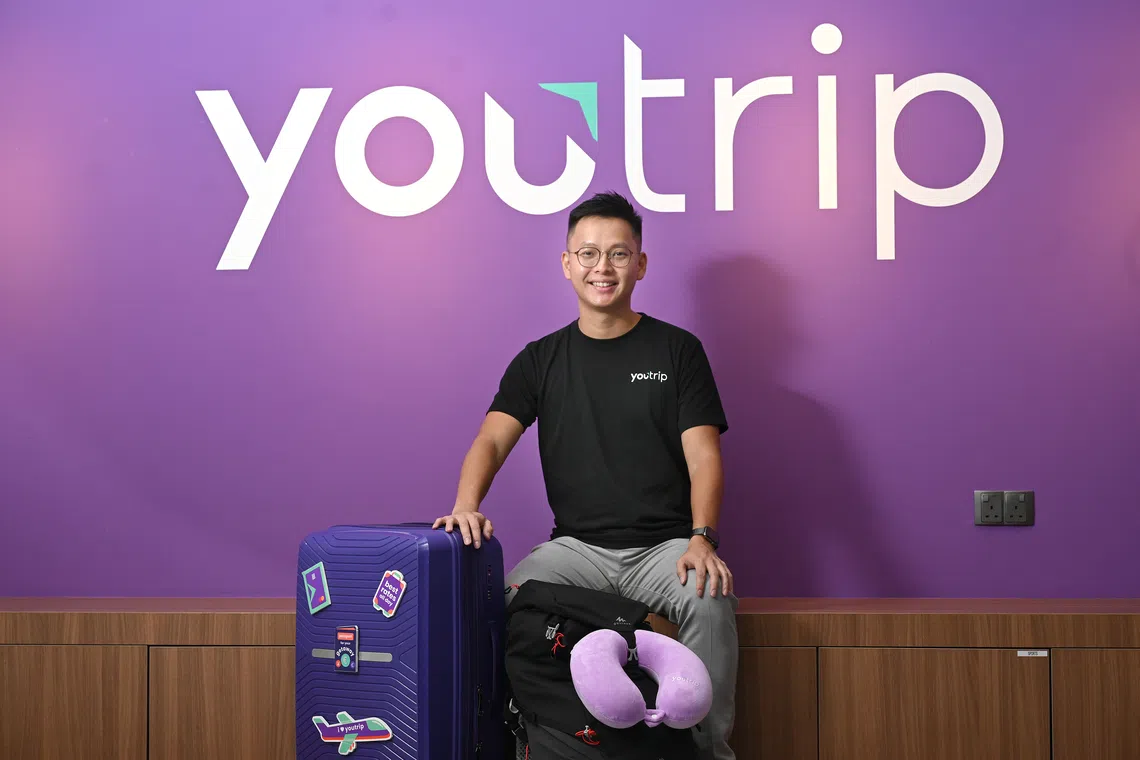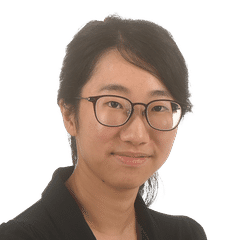Me and My Money: A year as a backpacker set him on road to becoming COO at e-wallet provider
Sign up now: Get tips on how to grow your career and money

Mr Kelvin Lam's passion for making finance easier for travellers dates back to his backpacking days, when queueing for cash exchanges was a pain point.
ST PHOTO: DESMOND WEE
Follow topic:
SINGAPORE - Mr Kelvin Lam was an investment banking analyst in Hong Kong – a job that could have guaranteed him an early retirement as he climbed the corporate ladder.
But he chose to quit the job at age 26 to backpack around the world, as a fulfilment of one of his retirement dreams, but “way ahead of schedule”, in his own words.
“While I felt deeply fortunate for the progress, recognition and promotions in what was considered a prestigious industry, it never sat very well with me that it would be a career for life,” Mr Lam, 37, said.
Little did he know that backpacking around the world would eventually lead him to being the chief operating officer, or COO, at home-grown fintech start-up YouTrip.
YouTrip provides users with a multi-currency digital wallet that offers good foreign currency exchange rates, making global spending more seamless and cost-effective.
Mr Lam said: “Travel has always been a passion of mine. That backpacker experience... gave me a realisation that I had always enjoyed adventurous and meaningful experiences over material possessions.
“I greatly enjoyed conversations in hostels with backpackers from completely different backgrounds, learning their stories, and even making trips together.”
Mr Lam took multiple trips across Latin America, the US, Taiwan and South-east Asia.
The longest stint was a four-month backpacking trip in Latin America, going to Argentina, Brazil and Peru, which cost him less than the equivalent of $7,000.
“The main cost was really the flight ticket. Accommodation-wise, I strictly stayed in dorms that cost roughly US$10 or less per night as anything closer to US$15 to US$20 back then was a luxury for me,” he said.
“Food-wise, I would sometimes carry bread, ham and apples in my backpack and those would be my meals, with occasional visits to restaurants.”
He also took land transport within Latin America or travelled by sea to save money, even sleeping in a cargo ship from Brazil to Peru on a seven-day journey that cost less than US$20.
“In hindsight, I see this as a bit of a soul-searching journey,” Mr Lam said. “The combination of breaking free of social norms but also needing to cope with your basic needs while watching your expenses in whatever you do was a profound and humbling experience. It helped me to understand what I really wanted in my life.”
After travelling around the world, he entered the fintech industry, beginning with forays in MoneyHero Group and SingSaver, before joining YouTrip – a venture that spoke directly to his love for travel, and passion for making finance easier for travellers.
“Being in the fintech industry with MoneyHero also reminded me of one financial dilemma that I kept thinking about when I was a full-time backpacker: that there had to be a better way to manage foreign currencies than queueing up for cash exchanges. That realisation sparked my desire to improve how people handle cross-border payments,” he said.
Q: What do you invest in and why?
A: YouTrip is no doubt my most important investment both financially and mentally. Apart from that, I allocate roughly 60 per cent of my investments to Asia and US equities, primarily in tracker funds; 30 per cent on bonds and treasuries; and 10 per cent on alternative investments like cryptocurrencies and start-up funds.
My investment approach is to invest only in what you can dedicate at least 10 minutes daily to follow and understand. This is harder than it sounds, especially for working professionals mentally fatigued from work and family responsibilities.
For me, running a cross-border payments business like YouTrip requires me to stay on top of macro trends and global news. Therefore, the investments I can consistently commit to track tend to be index-related or macro-driven themes, rather than single stocks or related investments.
Q: What was your first exposure to investing?
A: I was heavily exposed to equity investment at a young age, during my primary school days. Growing up in Hong Kong, I often accompanied my mum to the bank to deposit cheques and update her passbook – which, of course, is a relic of the past now. While waiting for her, I would stand in front of the TV displaying stock and indexes’ movements, sometimes with analyst commentaries, alongside the uncles and aunties in the bank.
I probably didn’t understand everything at the time, but I quickly became familiar with key stock tickers that people talked about, and even picked up some technical analysis terms. All this happened as I witnessed the 1997 Asian financial crisis unfold.
Q: What has been your biggest financial mistake?
A: Paying back five months’ worth of my bonus to leave investment banking in 2014 was both my worst and best financial decision so far. It was the worst financial decision because it was a promotion bonus that could only be clawed back if I left the job within 12 months – I quit with just four more months to go. The amount was a hefty sum that I would not make back easily within a short time, even now.
Q: What has been your best financial decision?
A: Quitting investment banking was also the best decision given the crossroads I was at, choosing between progressing in a well-paying career but lacking the passion my peers had to truly excel in the long run.
That “investment” in leaving ultimately opened my eyes, and being a full-time backpacker has led me to the start-up world. The financial sting serves as a lasting reminder that success isn’t about financial returns – it’s also about finding meaning in what you do.
Q: Moneywise, what were your growing-up years like?
A: I was taught to be frugal growing up, spending only when necessary and valuing what we had.
My parents did not give me pocket money, so I had to ask myself: “do I really need this?” before even considering requesting something new. This applied to items as small as stationery.
That mindset has carried over into how I approach my finances in business today. It makes me scrutinise the necessity and potential returns for each expense and investment before approving them.
Q: What was your most memorable encounter with money?
A: Growing up in a Chinese cultural environment in the 1990s, I developed an awareness of money early on but not always in a positive light. I saw how money could be a source of disputes within families, how the Asian financial crisis brought financial hardships to households, and how traditional customs, like Chinese New Year, often placed an overwhelming emphasis on wealth.
These experiences led me to view money with a certain disdain, as if it was more a source of conflict than security. That likely shaped my preference for valuing experiences over material possessions.
However, as I got older and began to understand the sacrifices my parents made – forgoing personal expenses and even proper medical treatment to provide a better life for their children – I saw money in a new light. I realised that managing money wisely isn’t about accumulation for its own sake, but about ensuring that your loved ones are never burdened or made to suffer because of it.
Q: Where’s home for you?
A: Home for me is a two-bedroom rented apartment in Alexandra.
Q: What do you drive?
A: I do not own a car.
Q: What would your perfect day look like?
A: It would start with a great tennis game at sunrise, followed by hitting meaningful milestones or targets at work. I’d also make time to share some light-hearted moments with my colleagues.
In the evening, I’d like quality time with my partner catching up on each other’s day over dinner. And I’d like to end the day with a call to my family to check how they’re doing before getting a restful night’s sleep.
Money Matters
Q: What would you do if you suddenly had a windfall of millions?
A: I’d take a few months off to travel the world again, but this time hopefully mixing backpacking and youth hostels with luxury hotel stays!
After that, I’d reinvest most of my money in my investment portfolio, patiently waiting for the day space travel becomes accessible. When that opportunity arises, I’d redeem those reinvestments for an unforgettable space adventure.
Q: If you suddenly only had $100 to your name, what would you do with it?
A: I’d buy a mobile phone from Carousell to start reaching out to business contacts, reconnecting with them to explore the next good opportunities.


